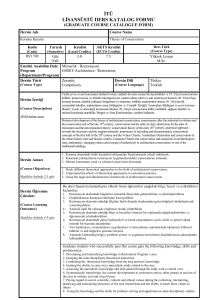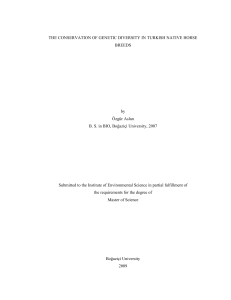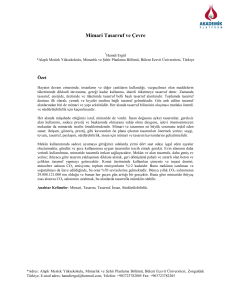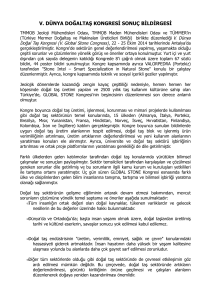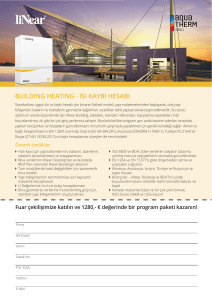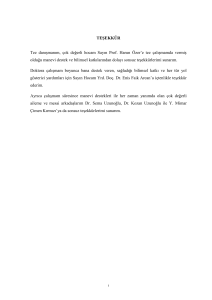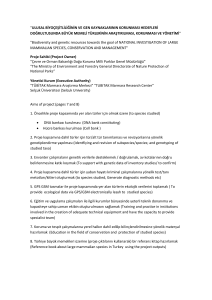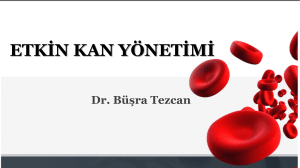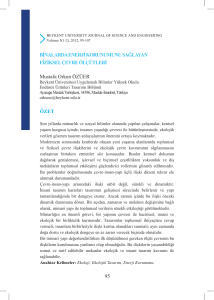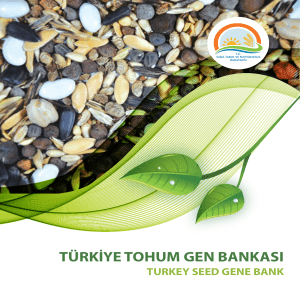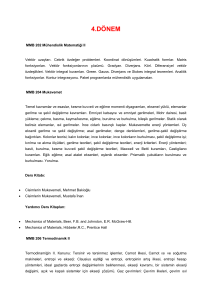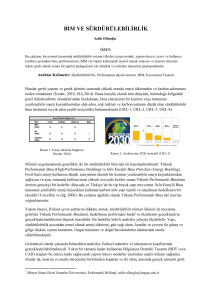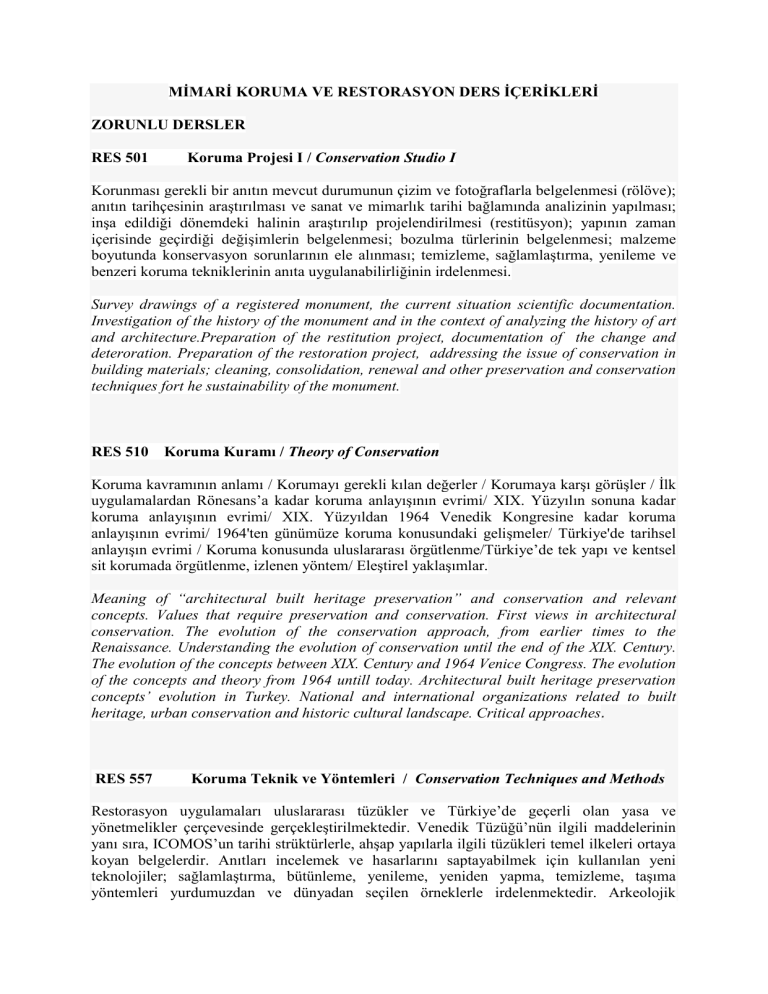
MİMARİ KORUMA VE RESTORASYON DERS İÇERİKLERİ
ZORUNLU DERSLER
RES 501
Koruma Projesi I / Conservation Studio I
Korunması gerekli bir anıtın mevcut durumunun çizim ve fotoğraflarla belgelenmesi (rölöve);
anıtın tarihçesinin araştırılması ve sanat ve mimarlık tarihi bağlamında analizinin yapılması;
inşa edildiği dönemdeki halinin araştırılıp projelendirilmesi (restitüsyon); yapının zaman
içerisinde geçirdiği değişimlerin belgelenmesi; bozulma türlerinin belgelenmesi; malzeme
boyutunda konservasyon sorunlarının ele alınması; temizleme, sağlamlaştırma, yenileme ve
benzeri koruma tekniklerinin anıta uygulanabilirliğinin irdelenmesi.
Survey drawings of a registered monument, the current situation scientific documentation.
Investigation of the history of the monument and in the context of analyzing the history of art
and architecture.Preparation of the restitution project, documentation of the change and
deteroration. Preparation of the restoration project, addressing the issue of conservation in
building materials; cleaning, consolidation, renewal and other preservation and conservation
techniques fort he sustainability of the monument.
RES 510
Koruma Kuramı / Theory of Conservation
Koruma kavramının anlamı / Korumayı gerekli kılan değerler / Korumaya karşı görüşler / İlk
uygulamalardan Rönesans’a kadar koruma anlayışının evrimi/ XIX. Yüzyılın sonuna kadar
koruma anlayışının evrimi/ XIX. Yüzyıldan 1964 Venedik Kongresine kadar koruma
anlayışının evrimi/ 1964'ten günümüze koruma konusundaki gelişmeler/ Türkiye'de tarihsel
anlayışın evrimi / Koruma konusunda uluslararası örgütlenme/Türkiye’de tek yapı ve kentsel
sit korumada örgütlenme, izlenen yöntem/ Eleştirel yaklaşımlar.
Meaning of “architectural built heritage preservation” and conservation and relevant
concepts. Values that require preservation and conservation. First views in architectural
conservation. The evolution of the conservation approach, from earlier times to the
Renaissance. Understanding the evolution of conservation until the end of the XIX. Century.
The evolution of the concepts between XIX. Century and 1964 Venice Congress. The evolution
of the concepts and theory from 1964 untill today. Architectural built heritage preservation
concepts’ evolution in Turkey. National and international organizations related to built
heritage, urban conservation and historic cultural landscape. Critical approaches.
RES 557
Koruma Teknik ve Yöntemleri / Conservation Techniques and Methods
Restorasyon uygulamaları uluslararası tüzükler ve Türkiye’de geçerli olan yasa ve
yönetmelikler çerçevesinde gerçekleştirilmektedir. Venedik Tüzüğü’nün ilgili maddelerinin
yanı sıra, ICOMOS’un tarihi strüktürlerle, ahşap yapılarla ilgili tüzükleri temel ilkeleri ortaya
koyan belgelerdir. Anıtları incelemek ve hasarlarını saptayabilmek için kullanılan yeni
teknolojiler; sağlamlaştırma, bütünleme, yenileme, yeniden yapma, temizleme, taşıma
yöntemleri yurdumuzdan ve dünyadan seçilen örneklerle irdelenmektedir. Arkeolojik
mirasının korunması da özel bir alan olarak ele alınmakta; dünyadan ve Türkiye’den seçilen
örneklerle arkeolojik restorasyonlarda kullanılan teknikler, yaklaşımlar irdelenmektedir. Ders
kapsamında öğrencilerden bir uygulamayı ayrıntılı olarak incelemeleri ve çağdaş koruma
ilkelerine göre değerlendirmeleri istenmektedir.
Restoration treatments are carried out in accordance with prevailing international laws and
regulations and national regulations in Turkey. As well as the relevant articles of the Venice
Charter, the ICOMOS documents outline the basic principles of historical structures’
conservation. New technologies used to detect and investigate damage to monuments;
consolidation, integration, renewal, redo, cleaning, transport methods are discussed with
examples from our country and the world. The protection of the archaeological heritage,
being considered as a special area; are introduced with the techniques used in archaeological
restoration and selected examples from the world and Turkey and new approaches are
discussed. Within the course, students are asked to evaluate an implemented project
according to the contemporary conservation policy.
RES 544
Geleneksel Yapı Malzemelerinde Bozulma ve Konservasyon / Deterioration
and Conservation in Traditional Building Materials
Geleneksel yapı malzemeleri, taş, tuğla, kerpiç, ahşap, tarihi yapılarda kullanılan doğal taşlar
çeşitleri, taşların fiziki, mekanik ve kimyevi özellikleri, gözenekli yapı malzemeleri içinde
suyun sıvı ve gaz halinde hareketi; ortaya çıkan mekanik gerimeler; suda çözünebilen tuzlar
ile hidratlanmış tuzların kristalleşme çevrimleri; biyolojik bozulmalar; geleneksel
bağlayıcılar, harçlar, sıvalar ve konservasyon harçları; taş temizleme yöntemleri;
sağlamlaştırma, yapıştırma ve plastik onarım yöntemleri; kil, kerpiç ve tuğlalar; taş koruma ve
onarım teknikleri; ahşap gibi organik malzemelerin bozulması ve konservasyonu.
Traditional building materials, stone, brick, mud-brick, timber, natural stone types used in
historical buildings, stone material’s physical, mechanical and chemical properties, liquid
and gaseous water movements in porous building materials; crystallization cycles of hydrated
salts with water-soluble salts; biological degradation; traditional binders, mortars, plasters,
mortar conservation; stone cleaning methods; consolidation, paste and plastic repairs; clay,
mud-bricks and bricks; stone conservation and restoration techniques; degradation and
conservation of organic materials such as timber.
RES 502
Koruma Projesi II / Conservation Studio II
İstanbul veya Anadolu'dan seçilen bir tarihi yerleşmenin mevcut durumunun çizim ve
fotoğraflarla belgelenmesi; yerleşmeyle ilgili mekansal, işlevsel, demografik, tipolojik
analizlerin yapılması; yerleşmenin korunması için gerekli basit onarım, restorasyon, yenileme,
çağdaş ek gibi müdahale kararlarının alınması; boşluklara yeni yapı önerileri getirilmesi.
Preparing an urban conservation project in a historic settlement selected from Anatolia
and/or Istanbul and documentation of spatial settlement, functional, demographic, typological
analysis; survey of the site and planning proposals in consideration with building retorations,
simple repairs necessary to protect the settlement, renovation, and contemporary additions to
be introduced to the site when necessary.
RES 545
Laboratory
Mimari Konservasyon Laboratuvarı / Architectural Conservation
Ders, geleneksel malzemelerin karakterizasyonunun belirlenmesi ve bozulma süreçlerinin
tanımlanmasına ilişkin bilgileri aktarmayı hedeflemektedir. Ders kapsamında hem teorik bilgi
aktarımı hem de deneysel çalışmalar birlikte yer almaktadır. Bu ders kapsamında yer alan
deneysel çalışmalar arasında mimari yüzeylerden örnek alma yöntemleri, gözenekli yapı
malzemelerinin fiziksel ve mekanik niteliklerinin belirlenmesi, tuzların hareketi, tuz
kristallenme çevrimleri, suda çözünebilen tuzların niteliksel analizi, geleneksel harç ve
sıvaların karakterizasyonu, onarım harçları için karışım tasarımları, yapı taşlarının
temizlenmesi ve bozulmuş taşların sağlamlaştırılması sayılabilir.
The aim of this course is to provide an introduction to the characterization of traditional
building materials an understanding of the deterioration process of the materials. The
curriculum consists of both lectures lab work. The experiments carried out during the course
include sampling of architectural surfaces ,determination of the physical mechanical
properties of porous building materials, movements of salts, salt crystallization cycles,
qualitative analysis of water soluble salts, characterization of traditional mortars and
plasters, mix designs of repair mortars, cleaning of building stones the consolidation of
deteriorated stone.
RES 509
Seminer / Seminar
Öğrencilerin tez konularıyla ilgili olarak hazırlayacakları ön çalışmalar (giriş, özet, amaç,
problem, hipotez/hipotezler, alt hipotezler, varsayımlar, sınırlılıklar ve yöntemi içeren
araştırma öncesi rapor) ve tezin yürütücüsünün de içinde bulunacağı bir jüri önünde
sunulması.
Preliminary studies to be prepared in relation to the students' thesis; introduction, summary,
objectives, problem, hypothesis/hypotheses, sub-hypotheses, assumptions, report prior to
research, including limitations and method. Presentation of the work at the end of the course.
SEÇMELİ DERSLER / ELECTIVE COURSES
RES561
Osmanlı Mimarlığında Yapım Teknikleri / Construction Techniques in
Ottoman Architecture
Osmanlı yapı üretim etkinliğine karar verme, tasarlama, projelendirme, aplikasyon aşamaları,
yapının kullanıma hazır hale getirilmesi, Yapım sürecine genel bir bakış. Osmanlı yapım
pratikleri üzerinde ayrıntılı araştırma için başvurulacak kaynakların tanıtımı, kaynak analizi
ve arşiv araştırması alanına giriş. Osmanlı mimarlığında Planlama ve projelendirme
teknikleri, temeller, duvar örgü sistemleri, topoğrafik ölçüm yöntemleri, metal donatı ögeleri
ve sistemleri, üstyapı öğeleri ve yapım yöntemleri, kalıplar ve inşaat iskeleleri, ahşap
konstrüksiyon, bitirici öğeler ve uygulanmaları. Osmanlı yapım geleneğinin paralel ve öncül
diğer modern öncesi pratiklerle ilişkisi.
The decision-making, design, projection and application phases of Ottoman building
construction techniques, making the building complete for use, an overview on the
construction process, introducing the resources relating to Ottoman construction applications
for a detailed research, introducing the resource analysis and the archival research. The
planning and projecting techniques in Ottoman architecture, foundation systems, walling
systems, topographical measurement methods, reinforcement elements and systems, elements
and construction methods of the superstructure, molds and scaffolding, timber construction,
finishing materials and applications, the relationship between the traditional Ottoman
construction techniques and the prior (especially pre-modern) and/or concurrent practices.
RES571
Restorasyon Öncesi Tespitler, Teknik ve Teknolojiler / Diognastic
Techniques and Technologies Before Restoration
Derste, çoğunluğu çeşitli şantiyelerde, yapılan restorasyon öncesi tespitlere yönelik analiz
yöntemlerinin irdelemesi yapılır. Ayrıca ders kapsamında yapılan uygulamaları yerinde
incelemeler yapılmaktadır. Saha dersleri esnasında öğrenciler yöntem, teknolojileri yakından
incelemekte ve karşılaştırma, değerlendirme olanağı sunulmaktadır.
In this course, students are to examine the technologies and techniques closely at restoration
applications on site. The course gives a chance to compare and evaluate the results of
different techniques and technologies.

